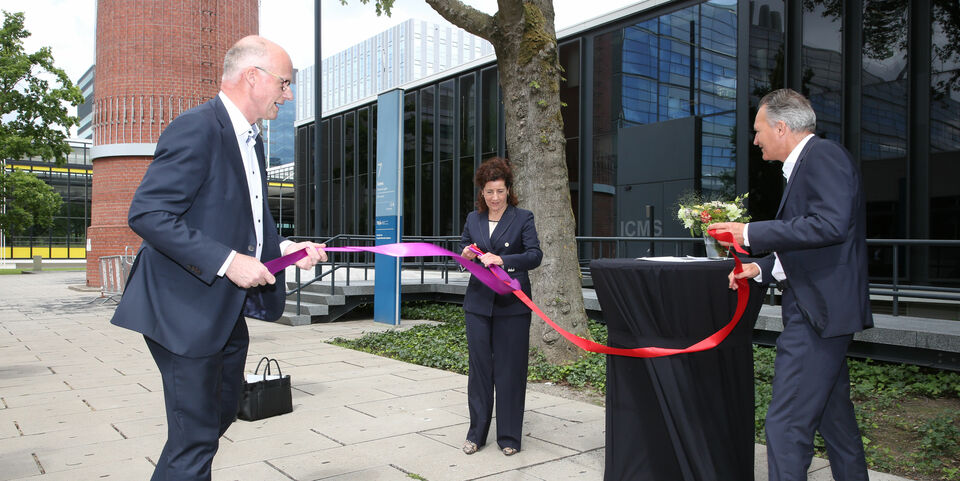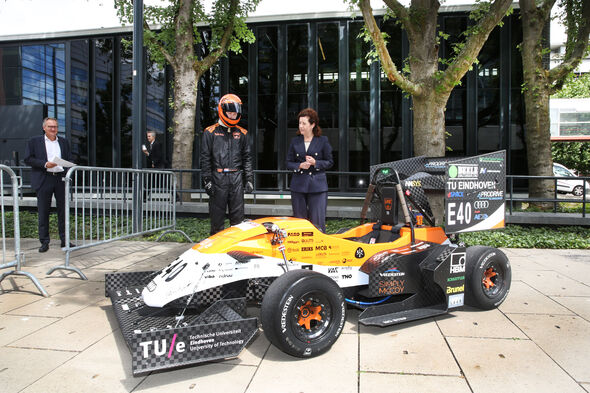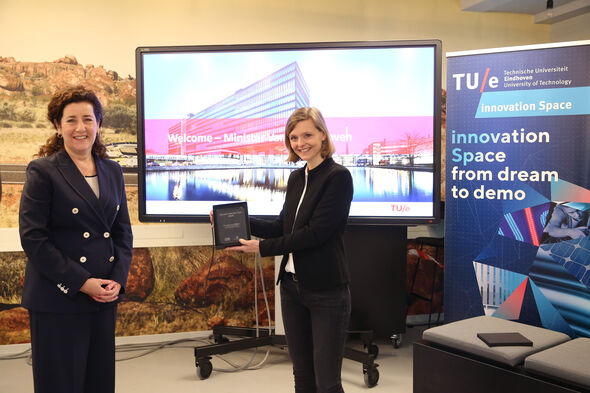Visit from Minister Van Engelshoven is all about collaboration
Multidisciplinary collaboration was the common thread during the visit of Minister Ingrid van Engelshoven to TU/e this Monday morning. The visit of the Minister of Education, Culture and Science is part of a tour of various Dutch higher education institutions now that they are allowed to slowly restart education on campus again.
The common thread mentioned earlier was physically present as well: in purple and red. Because these two colors in two smooth ribbons now represent the collaboration between Fontys and the TU/e, which was confirmed in a covenant this morning. The two higher education institutions will collaborate more. It did not go unnoticed for who was on campus at the time: a speedster in one of the racing cars of University Racing Eindhoven personally handed over the papers to the minister.
The minister is visibly impressed by all the interdisciplinary collaborations that takes place at and around TU/e. From the examples in innovation Space - where two students from the GOAL 3 student team talk about their contactless patient monitor that can improve healthcare in developing countries - to interesting applications of molecules, such as a heart valve that grows with the body and coatings for bendable screens as well as Artificial Intelligence applications against corona via the Eindhoven Artificial Intelligence Systems Institute (EAISI). Throughout the campus, scientists with different backgrounds work together on social challenges.
The minister calls this “a time of fantastic challenges” to which Isabelle Reymen, scientific director of innovation Space, immediately responds: “Definitely, for example when the Muziekgebouw asked our help on how to open the building safely again. We recently completed that case.” The minister is pleased with the collaboration in the region: "It is great to see not only the different scientific disciplines working together, but also the companies being involved."
Dutch or English
During the visit, the language of education is also discussed: English is increasingly dominant at TU/e. But that also has its reasons, TU/e rector Frank Baaijens explains: “We also need different perspectives to find answers to the global challenges, for which it is important that Dutch and international students work together. It is also the case that if we want to teach certain programs in Dutch only, we already exclude a large part of our academic staff from teaching.”
The minister immediately responds to this, looking at Ines Lopez Arteaga from Spain, dean of the Bachelor College, and Johanna Höffken from Germany, teacher of Innovation Sciences. Both teach in Dutch. The minister expresses her admiration for this and asks where they have learned the language. "With the nuns in Vught," Lopez replies, and for Höffken her Dutch partner appears to have had a good influence on her language development.
Not much later, Höffken receives the ISO award for excellent teaching from the minister. “The best thing about this award is that it really is a prize from the students. The jury found your passion catching and was impressed by your sharp ideas to make the world a better place.”
Restart of education on campus
Dean Lopez talks about how education will be blended learning after the summer: partly online and partly small-scale on campus. “That makes us agile, should stricter corona measures suddenly become necessary again by then. Lectures can also go online very well. Students indicate that they are happy with the online education, but miss the interaction. However, some forms of education, such as in innovation Space, simply work better here on campus, which means we also offer students forms of interaction.”
A final question for the minister: "What do you think of the verdict of The Institute for Human Rights on the Irène Curie program at TU/e?" Van Engelshoven: “I value the verdict and even though the policy may have been executed a bit too far at TU/e, it also shows that a preference policy is allowed. There is a desire at TU/e to employ more women in scientific positions. So we can work towards that and that is the big win here.”




Discussion